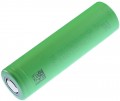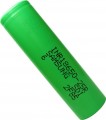Capacity
The rated capacity of a battery is the amount of energy it can store.
This parameter directly determines how long the power supply can operate with a particular load. However, when assessing capacity, there are two things to consider. First, the capacitance rating is usually specified for a specific discharge power. So, for salt and alkaline full-size batteries (see “Technology”), this power is measured in tens of milliamps. But if it is significantly exceeded (on the order of hundreds of milliamps), the actual capacity of the battery may decrease significantly compared to the declared one. Therefore, for example, it is not recommended to use disposable batteries in digital cameras - the power consumption in such equipment can exceed 1000 mAh, and NiMh batteries cope best with such a load. And miniature silver-zinc batteries of the “300” series (SR) are available in two versions - for high and low discharge power; CR series button batteries can have a similar low-power version (for more details on both, see “Size”). More detailed information on discharge currents for different types and sizes of batteries/accumulators can be found in special sources; and in some cases (mainly for lithium-ion batteries) it is directly specified in the characteristics (see “Nominal discharge power”, “Maximum discharge power”).
The second caveat is that the actual energy reserve depends not only on the number of milliamp-hours declared, but also on the operating voltage;...so you can only compare by numbers in mAh batteries/accumulators with the same voltage (in extreme cases, with a similar voltage, for example, 3 V and 3.6 V). However, other comparisons are rarely required in practice.
Rated discharge current
Rated discharge current provided by the battery. This is the highest discharge current at which the battery will operate without a voltage drop and without a noticeable decrease in the actual capacity. It is worth paying attention to this parameter first of all if the battery is purchased for a device that is sensitive to supply voltage — for example, for a multimeter.
The rated discharge current is indicated only for rechargeable batteries (see "Type").
Maximum discharge current
The maximum discharge current provided by the battery is the maximum current that the battery can deliver without the risk of overloading, overheating and other troubles. This indicator directly determines compatibility with a specific device: the current consumed by the load must not exceed the maximum battery discharge current.
The maximum discharge current is indicated only for rechargeable batteries (see "Type"). By definition, it is greater than the nominal one (see above), but it is worth recalling that when the rated current is exceeded, the voltage at the battery output decreases. Therefore, in some cases, it is necessary to choose a battery exactly according to the rated discharge current.

